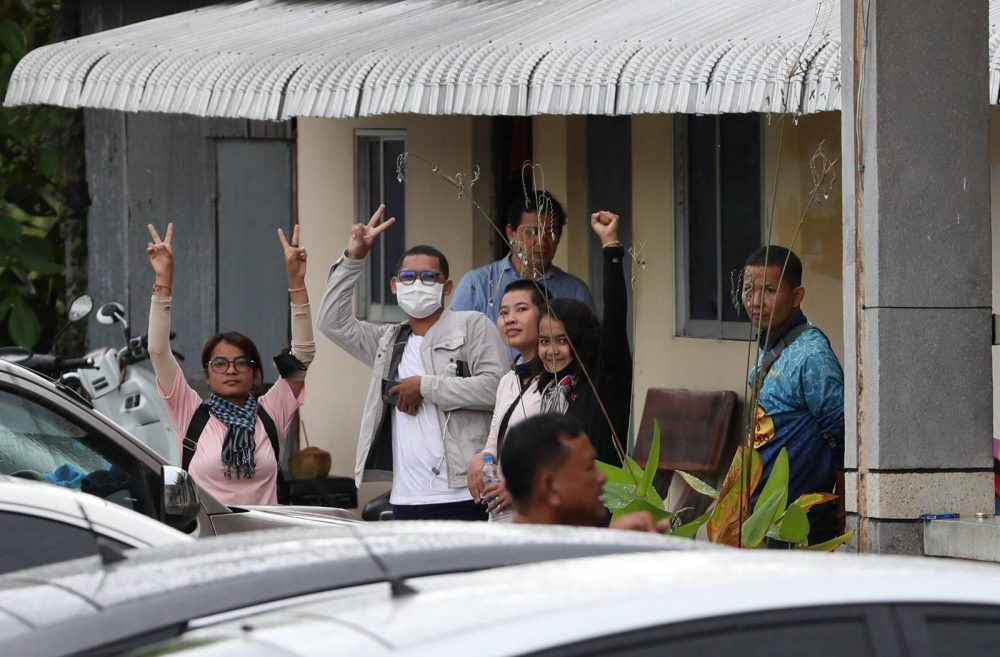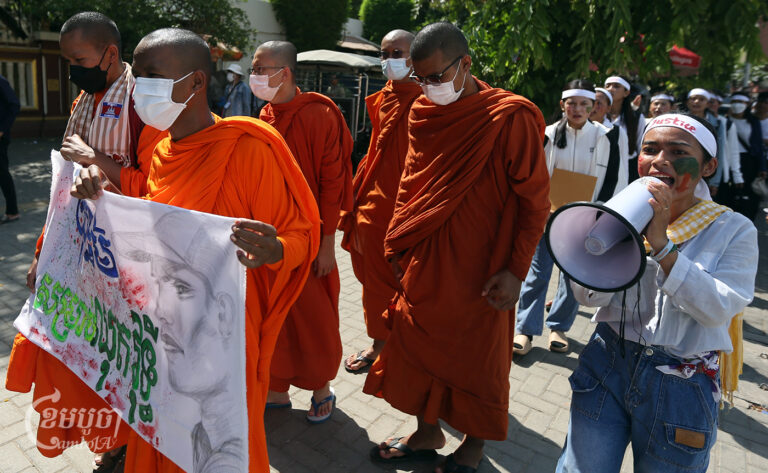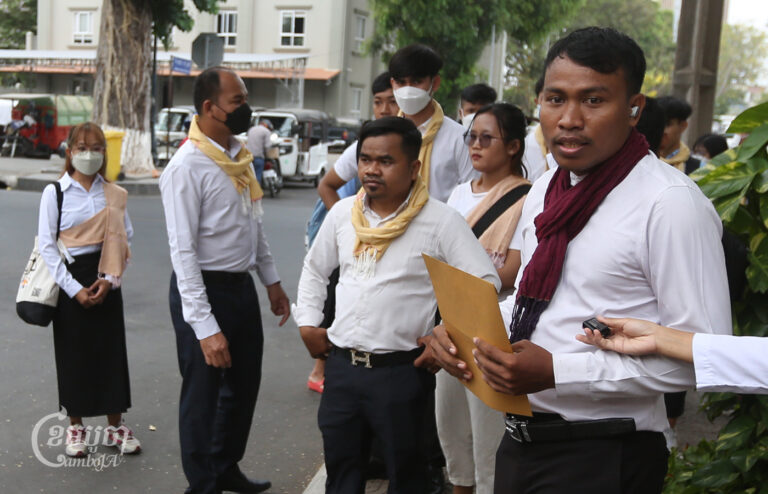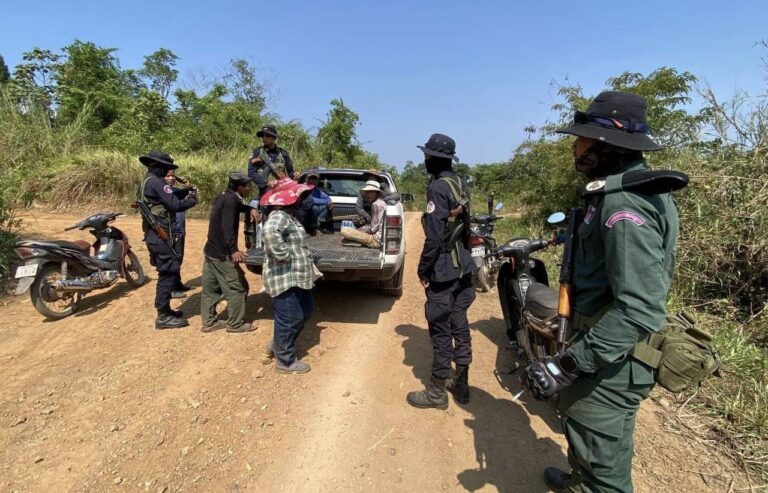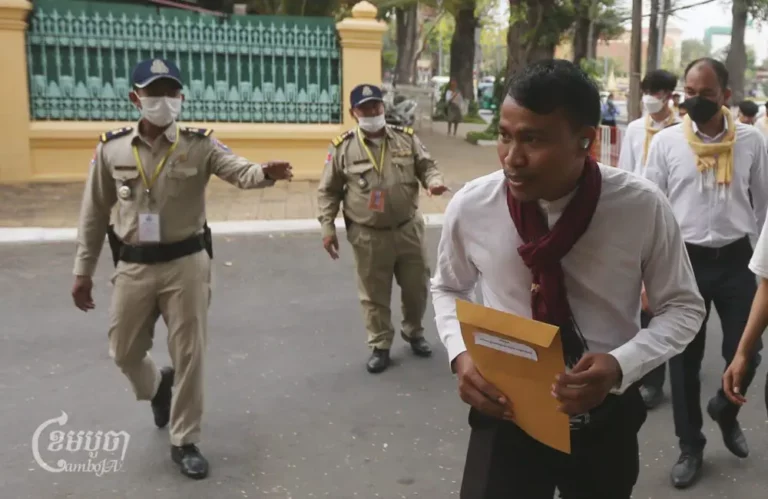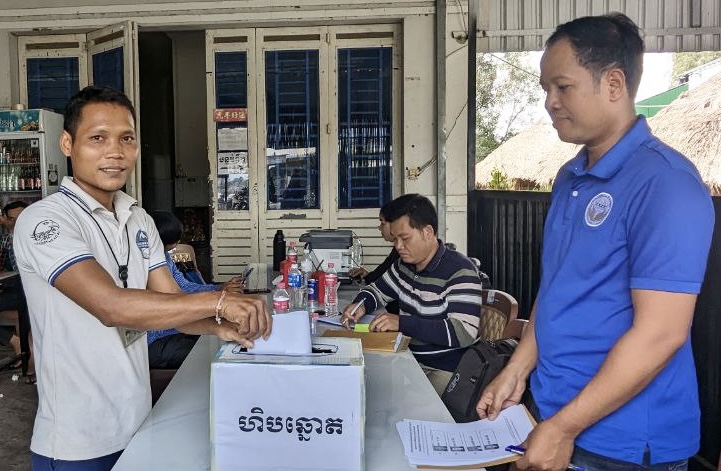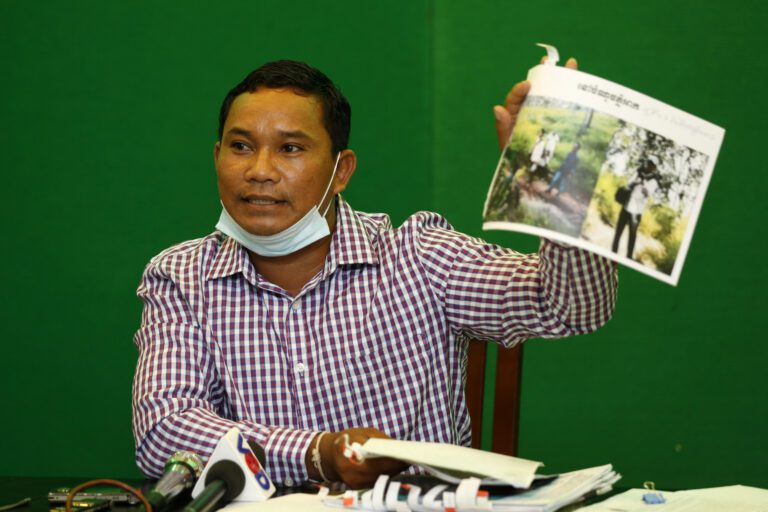In mid-August, Chhoeun Daravy and eight others found themselves negotiating with police over the wording of a handwritten contract. Officers initially wanted the agreement to say that the nine had “illegally” entered a “prohibited area” in the recently logged Phnom Tamao forest and flew a drone — all without permission from authorities, Daravy recalled.
She and three other members of social justice group Khmer Thavrak, as well as five journalists from local news outlet VOD, were arrested in the forest by officers from the prime minister’s bodyguard unit and brought to the Bati district police station in Takeo province.
The activists had been heading to the Takeo forestry department to submit a request to observe what areas of the forest had been cleared and newly planted, Daravy told CamboJA this month.
After one activist was live-streaming on Facebook from the forest, authorities arrested them and the journalists, who were separately documenting the aftermath of the forest clearing. Authorities hit two of the nine during the arrest, confiscated everyone’s phones and equipment, and held them at the police station for about seven hours.
They were released without charge after agreeing to thumbprint the police contract — after officers agreed to some adjustments.
While Daravy said police did not force them to sign, authorities regularly compel detained activists and others to sign contracts at police stations in which they are made to admit guilt without the presence of a lawyer and pledge to not repeat activities branded by authorities as criminal.
In 2021, 59 people were made to sign or thumbprint contracts after being arrested or summoned to a police station over incidents involving exercising freedoms of association, expression or assembly, according to the Cambodian Center for Human Rights’ media monitoring and incident reports.
In the first nine months of this year, CCHR said 102 people were made to endorse police station contracts, showing a documented rise from last year.
Peaceful protests, selling T-shirts and documenting deforestation have all resulted in activists being arrested and pushed into signing agreements with police, who claim the contracts are signed willingly by perpetrators of minor crimes.
But an activist’s thumbprint is often a thinly-veiled condition of their release from custody, and can be used as evidence against them in court. Human rights campaigners and lawyers say police station contracts, hastily drawn up and signed by dissidents under duress, have no legal basis and are used by authorities to intimidate activists into ceasing their campaigns.
“Instead of forming part of the legal process, police contracts appear to be designed to intimidate arrested individuals and, in the case of activists, to deter them,” said CCHR director Chak Sopheap.
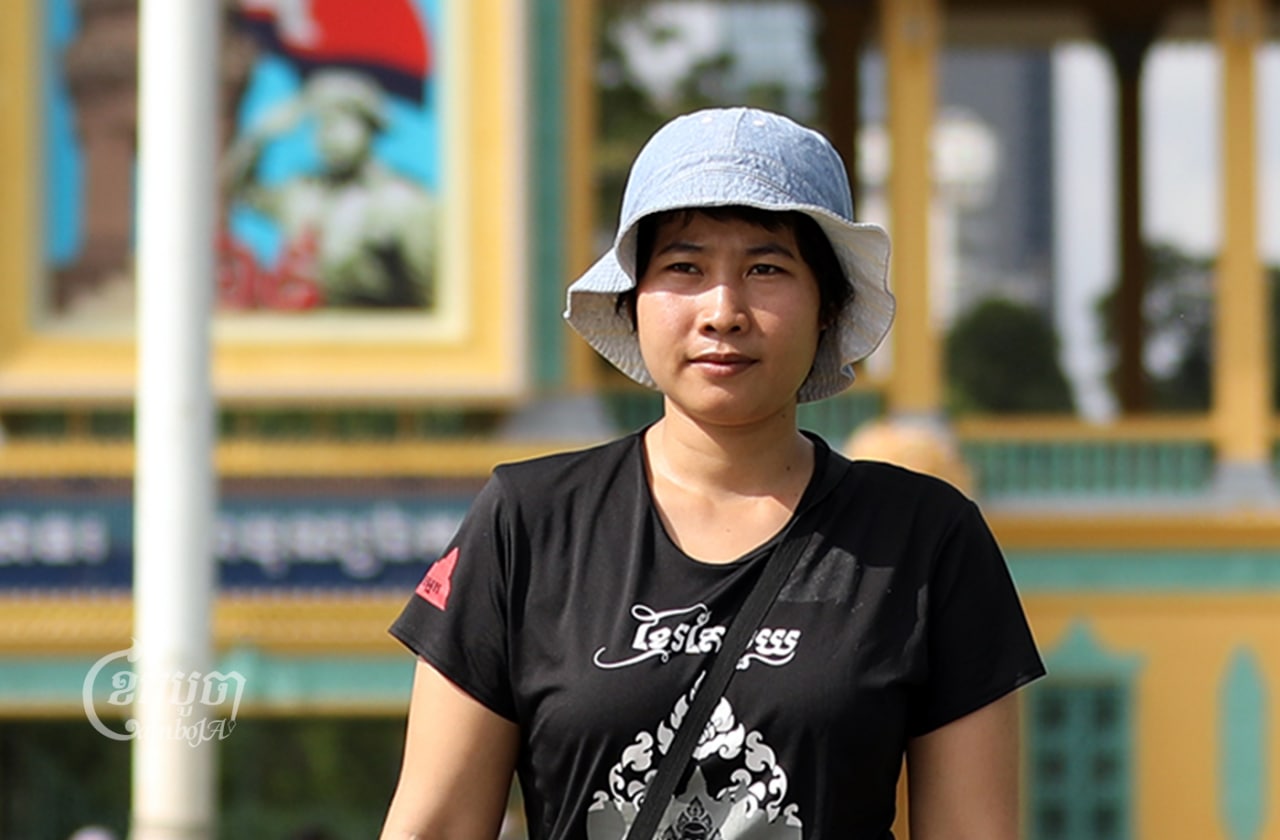
The agreement Daravy and the eight others ultimately signed omitted the word “illegally,” and added that they did not agree that the area they had entered in Phnom Tamao Wildlife Sanctuary was off-limits. The contract also stated that only the journalists flew a drone and the nine entered the forest without permission from authorities.
“If next time our teams publish fake news, fabricate the facts or cause chaos in this area, I will be responsible for all of my actions under the law,” the document says, referring to the nine who stamped their thumbprint in red ink on the two-page contract.
The police’s originally proposed wording made it sound like the nine were admitting wrongdoing for entering the forest, Daravy said.
“There was no sign saying that these were prohibited areas, and I do not think we needed to ask for any permission to just go check the deforestation,” she added. “The authorities always try to stop us from doing our jobs.”
“Police Acting as a Judge”
Despite officials’ claims that police station contacts are admissible, and even useful as deterrents, the agreements have no legal basis, according to human rights advocates and lawyers.
Sok Sam Oeun, chief attorney at AMRIN Law and Consultants Group, said police station contracts were “only a threat” from authorities and not part of the official legal process.
Some police ask detained people to sign a contract promising not to repeat an activity that authorities oppose, such as protesting. If the signers do it again, some police think they have the right to arrest them, Sam Oeun explained.
“If the people [who were arrested] do not understand the kind of contract, they think if they breach this contract — if they do something wrong — [the police] will have a reason to arrest them,” he said. “So they stop [their activism] because they’re scared.”
“In fact, [authorities] want to arrest those people and put them in jail because they make the government look bad,” he added.
Attorney Kong Sam Onn, the president of the Asia Law Office, said police contracts could serve as a compromise and preventative measure by police to prevent public disturbances.
But contracts may be considered illegal if the agreement was signed under coercion, or if the contract violated the signatories’ rights, such as by including a promise not to demonstrate in a public space, he said.
“When you force someone to make a contract, this is not accepted under the law,” Sam Onn said. “If it’s a contract to abandon your legal rights, this is the worst scenario.”
“Making a contract, the police is acting as a judge,” he added.
Sopheap, of CCHR, said one could argue that such contracts “constitute a forced confession” since the detained person’s release is “often made conditional on them signing the contract in which they generally must acknowledge their ‘wrongdoing’ and pledge not to re-offend.”
Police may use the contracts because they could “act as an effective deterrent while requiring much less paperwork than the filing of charges would,” she said.
Given the prevalence of police contracts, more training of activists and others is needed, Sopheap added, “so that they can denounce the practice when it occurs and resist it.”
Yet often, detained activists and others say they have little choice but to sign the contracts — if they want to go home from the police station, instead of to court or jail.
“The Only Way to Get Released”
Sok Sreynich, a 28-year-old opposition supporter and the wife of Candlelight Party commune councilor and former activist Kung Raiya, said she and two relatives were coerced into signing a contract at Phnom Penh’s Toek Thla commune police station in 2019, after Raiya was arrested for advertising commemorative Kem Ley T-shirts for sale online.
“My brother-in-law, sister-in-law and I were not involved in selling Kem Ley shirts, but still, the commune police came and arrested us,” Sreynich said. Prominent government critic Kem Ley, an idol of Raiya and many others, was murdered in 2016.
Sreynich said police forced her and her relatives to sign an agreement without being given a chance to read it, and threatened to send them to court or jail like Raiya if they refused to sign.
“[Police] just shouted harshly at us, as if we committed severe crimes, and forced us to put our thumbprints on the contract,” she said. “It is an injustice because I did nothing wrong. Why force me to sign?”
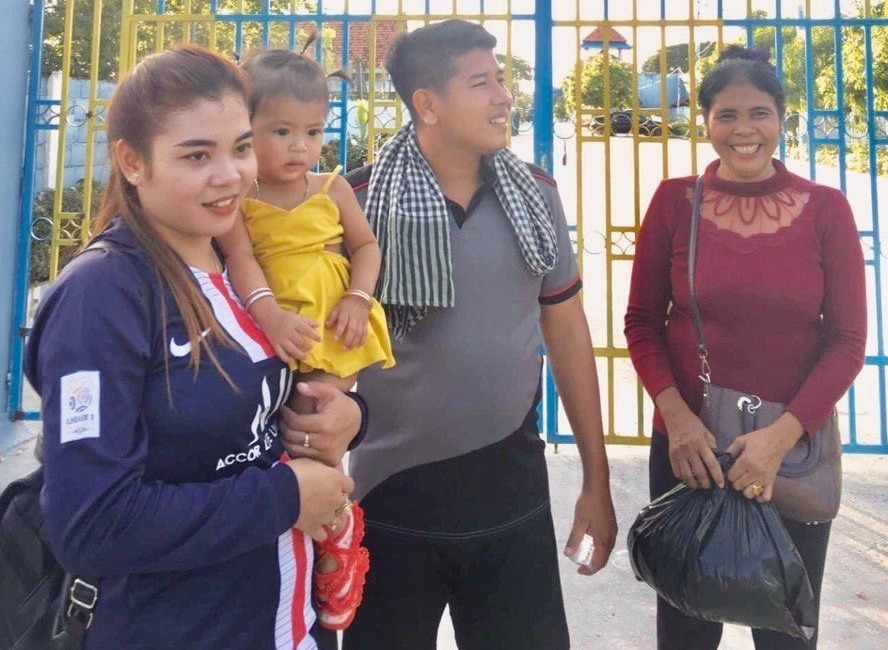
Officers told Sreynich that the contract the three signed said they accepted they were wrong to advertise and sell Kem Ley shirts, and would willingly allow police to arrest them if they did it again, she said.
“I did not want to [sign], but it was the only way to get released,” Sreynich recalled.
“No Choice but to Sign”
In February 2021, while hanging Buddhist saffron scarves on trees in Prey Lang Wildlife Sanctuary and posting anti-logging signs, Heng Sros and four other environmental activists were detained by Kratie provincial environment department officers and forced to sign an agreement with the department before being released.
At first, they refused to sign and admit guilt.
“We asked them to take us to the court if we did something wrong,” Sros said. “But still, the provincial court followed the department’s request, which gave us no choice but to sign the contract to get released.”
The agreement said they would stop entering the protected forest without government permission. At the time, Environment Ministry spokesperson Neth Pheaktra told CamboJA that the five activists had admitted to “secretly breaking” into the forest.
Since they signed the police contract, Sros said authorities have targeted him and others while they document illegal logging, including in Prey Preah Roka Wildlife Sanctuary in August.
An “Educational Measure”
National Police spokesperson Chhay Kim Khoeun said police use contracts as deterrents with perpetrators of minor crimes and with suspects in cases where police don’t have enough evidence to send them to court.
“Sometimes, we ask the suspect to sign a contract because we do not have enough evidence to accuse them when they obviously committed the crime,” he said.
“However, the contract is made by agreement from both sides — police and suspect. We never force them to sign. If they refuse to [sign], we record the case and send it to the court,” he said, without explaining why someone would be sent to court if authorities did not have sufficient evidence to convict them.
By signing a contract, he said arrested individuals permit the police to observe their actions for a period of time to ensure they will not repeat their actions.
Sao Saron, deputy Bati district police chief, said police station contracts were used as an “educational measure” for minor crimes and denied coercion.
If the Khmer Thavrak activists and VOD journalists had refused to sign a contract in August, Saron said officers would have still drafted one and noted the nine’s refusal to sign it, but police would not have sent them to court unless they entered “prohibited areas” in Phnom Tamao forest again.
“It is not wrong to just take pictures, but they did not ask permission from the [prime minister’s] bodyguards who were on a mission to plant trees there,” he said. “If they do it again, the police will record the case and send it to the court directly.”
Asked about the Phnom Tamao case, Justice Ministry spokesperson Chin Malin said a contract should only be used if both police and the detained individual agree, adding that the practice is a first step officers may use to “educate,” or warn, people.
“If [arrested people] do not reach an agreement regarding this administrative punishment, police can record the case and implement it according to the law,” Malin said, suggesting charges could be brought against them.
For serious crimes, he said suspects were sent to the court directly and not given the chance to sign a contract.
Human rights group Licadho has observed police contracts collected, shown by police or filed by a prosecutor as “evidence” in a few trials, according to outreach director Naly Pilorge.
But only a prosecutor or investigating judge can legally charge someone, so unless one is present, agreements made at police stations are typically used out of routine or habit rather than by law, she said.
Contracts are often signed within the 48-hour period in which police and prosecutors can refuse detained people access to a lawyer under the criminal procedure code. With “legal justification,” arrested people can be held in police custody for up to 72 hours, but then must be released, investigated, charged or imprisoned by the courts, Pilorge said.
In a 2014 report, Licadho detailed various accounts of police exacting forced confessions through physical violence and threats of detained people. Since then, Pilorge said not much has changed except that some people have publicly reported being tortured to exact confessions and tried to sue the police.
“A Threat to Youth”
For Khmer Thavrak’s Daravy, her detention in August was not her last experience thumbprinting agreements with authorities. Earlier this month, the group held a hunger strike to call for the release of jailed opposition activist Seng Theary.
While sitting in Phnom Penh’s Freedom Park during the campaign, Daravy said authorities monitored and questioned the activists about their addresses, jobs and intentions. As usual, she said, they wrote a report, which the activists were required to thumbprint at the park.
The document originally said, erroneously, that it was illegal to strike in a public place without getting permission from authorities, according to Daravy.
“I always look closely at what [authorities] write in the agreement. There are some points written to pressure the strikers. Therefore, I ask them to omit it or I do not sign and give my thumbprint,” she said.
It’s one way the 32-year-old campaigner resists the use of police contracts, which she said are meant to intimidate young activists.
Contracts, she said, are “a threat to Cambodian youth who want to participate in addressing social issues or claiming justice.”


